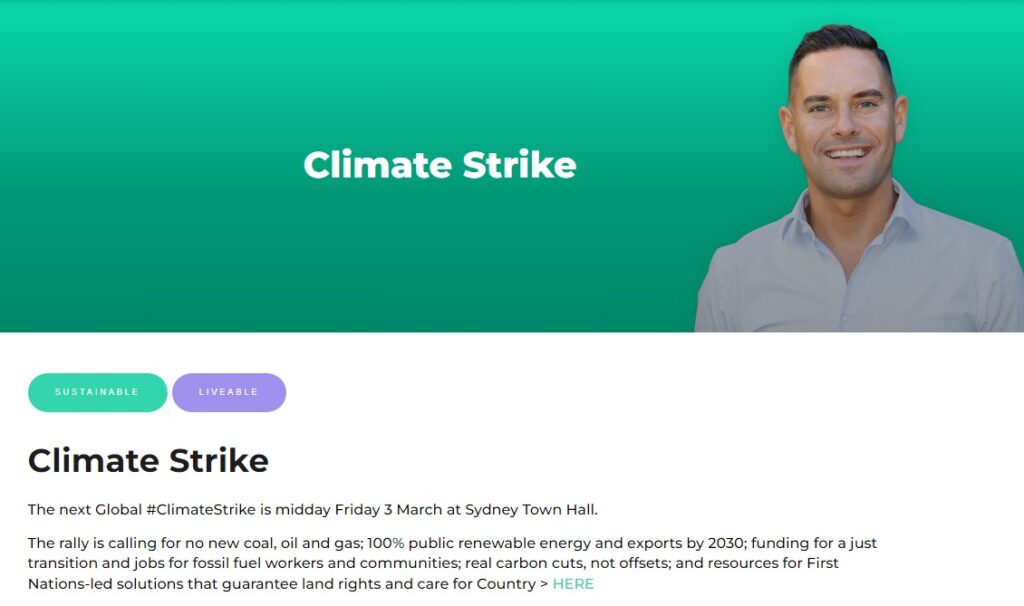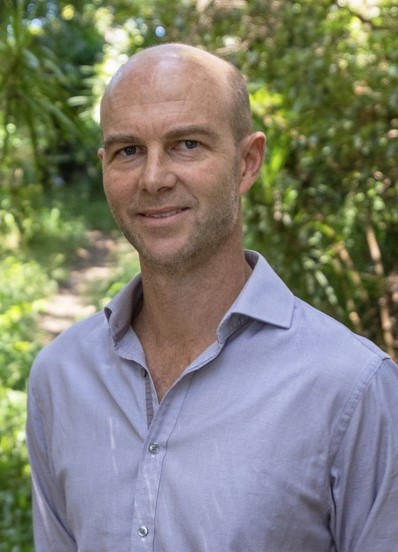Pat Schultz
All Greens candidates for the NSW state election have been assessed by Vote Climate One as Green Light Candidates because of their strong policy and action on climate.

CLIMATE CHANGE
Principles
The Greens NSW believe that:
1. Humans have radically altered Earth’s biophysical environment; this degradation poses the greatest threat to our planet’s climate system. A meaningful shift by communities, governments and corporations to a more harmonious and symbiotic relationship with Earth’s living systems is urgently required.
2. Climate change threatens all aspects of life. It is already disrupting human societies through changing weather patterns, extreme weather events, desertification and sea level rise. It threatens food security, water, the economy, social cohesion and the well-being of humans and other living things. Impacts will escalate, putting increased pressure on natural resources and consequent impacts on our ability to satisfy basic human needs. These impacts will disproportionately affect the most vulnerable in our society.
3. There is an urgent need to both reduce emissions to limit the severity of climate change and to proactively plan for a more hostile climate.
4. The scientific evidence is unequivocal. Average world temperatures continue to rise at an unprecedented rate. This is mainly due to human-induced greenhouse gas emissions (such as carbon dioxide and methane), black carbon in the lower atmosphere and deforestation.
5. The economic, social and environmental consequences of delaying action are so dangerous that an emergency plan with appropriate investment must be implemented to drastically reduce emissions by 2025 and reach zero or negative net emissions by 2035.
6. NSW is a wealthy state, ideally placed to take a lead in addressing climate change. There is no excuse for NSW continuing to have high per capita emissions compared to other jurisdictions and being a large contributor to Australian emissions.
7. NSW should recognise that climate change presents threats of serious and irreversible damage and should take appropriate action, in accordance with the precautionary principle, to mitigate and respond to such threats.
8. Climate change is an environmental, economic, moral and ethical issue. Future human generations, and other species, must not be burdened with the dire consequences of this generation’s inaction in preventing climate change.
9. Climate change necessitates a transition away from an economy reliant on unsustainable consumption. We need to plan and enact a transition to a more sustainable and equitable society as a matter of urgency.
10. NSW is ideally placed to address climate change and to contribute solutions in many areas, particularly given our ability to innovate and our research capabilities, and these efforts must be supported as a priority.
11. Short lived climate pollutants (including methane, nitrous oxides, sulphur oxides, hydrofluorocarbons and black carbon) have an enormous short-term impact on global warming. Drastically reducing emissions of these pollutants will have a rapid impact in the transition to a safe climate.
12. To help ensure appropriate mitigation strategies for both CO2 and short-lived climate pollutants, emissions inventories should show climate impacts over 20 years (the critical period if we are to keep global warming well below 2 degrees) as well as 100 years. Consistent with the precautionary principle, all substances that cause warming (such as black carbon and carbon monoxide) should be considered, even those for which precise Global Warming Potentials (GWPs) are not yet available.
13. Mining, export and domestic use of fossil fuels contribute to climate change and must be phased out as a matter of urgency. All fossil fuel subsidies should be abolished.
14. NSW has the capacity to ensure that our energy supply and land transport needs can be provided by renewable energy.
15. Agriculture and the production of foods and fibre contribute to climate change. They must both adapt to the impacts of climate change and adopt more sustainable practices to reduce emissions.
16. While the first priority is to reduce the emission of greenhouse gases, environmentally appropriate methods to draw down these gases can also contribute to achieving long term goals.
17. Thousands of new jobs, particularly in rural and regional areas, can be created by prioritising investment in low carbon technologies. Similarly, thousands of jobs can be created in adapting urban and regional centres to meet the challenges of climate change.
18. The costs and benefits of transitioning to net zero global warming must be fairly distributed across society, minimising the adverse impacts on communities that are at the leading edge of change and on those who are most disadvantaged.
19. Logging and burning wood from forests is not climate neutral and often increases global warming.
Aims
The Greens NSW will work towards:
20. NSW contributing its fair share of resources and actions to limit the global average temperature increase to well below 2°C and as close as possible to 1.5°C above pre-industrial levels, in keeping with Australia’s ratification of the Paris Agreement.
21. Incentives for individuals and industries (including agriculture) provided by Government to remove CO2 from the atmosphere, e.g. planting trees, kelp forests, investigating biomass storage and other methods to return to 350 ppm CO2.
22. Building support in the community for urgent action to achieve a safe climate.
23. Developing a strategy to effect an equitable transition to a sustainable net zero economy through a range of measures including market and regulatory, including a price on emissions with the proceeds used to compensate low income individuals.
24. Supporting the transition strategy with a well-funded, comprehensive, integrated and research-based emissions reduction plan with appropriate targets and reporting for all sectors with significant greenhouse emissions.
25. Achieving 100% clean renewable electrical energy in NSW by 2030, or earlier.
26. Achieving sufficient renewable electricity capacity to power all heating and land transport, including passenger and freight rail, either by direct use of renewable electricity or, in future, by indirect use, e.g. via electrolysis to produce ‘green’ hydrogen and ammonia.
27. Implementing emissions reductions and local adaptation strategies in conjunction with other governments, national, state and local, and in consultation with local communities.
28. Implementing emissions reduction strategies as outlined in the relevant Greens NSW policies of Energy, Transport, Planning and Infrastructure, Coal and Coal Seam Gas, Forestry (in development), Coastal Management and Sustainable Agriculture and Rural Land Use and Waste (see links at the end of this document).
29. Introducing a ban on donations to political parties or candidates from any person or corporation with a commercial interest in any aspect of the fossil fuel industry including mining, transport, electricity generation or distribution.
30. Ensuring that impacts and opportunities are spread as fairly as possible across society with assistance to those at the leading edge of change and those who are most disadvantaged.
31. Funding research into the local impacts of climate change and methods to minimise their impact.
32. Proactive assistance to other nations, particularly in our region, to create safe climate economies, and adapt to climate change through appropriate technology transfer and other forms of assistance, including resettling and rehousing displaced populations where required.
Relevant policies
Almost all Greens policies relate to the management of the Climate Emergency, especially:
Air Quality, Agriculture and Rural Land Use, Biodiversity, Bushfire Risk Management, Coal and Gas, Coastal Management, Energy, Environmental Impact Assessment, Forests, Housing and Homelessness, Industry, Planning and Infrastructure, Regional Development, Transport, and Waste Elimination.
Revised October 2022









